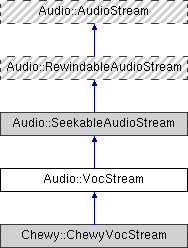◆ anonymous enum
| Enumerator |
|---|
| kSampleBufferLength | How many samples we can buffer at once.
TODO: Check whether this size suffices for systems with slow disk I/O.
|
◆ readBuffer()
| int Audio::VocStream::readBuffer |
( |
int16 * |
buffer, |
|
|
const int |
numSamples |
|
) |
| |
|
overridevirtual |
Fill the given buffer with up to numSamples samples.
Data must be in native endianness, 16 bits per sample, signed. For stereo stream, the buffer will be filled with interleaved left and right channel samples, starting with the left sample. Furthermore, the samples in the left and right are summed up. So if you request 4 samples from a stereo stream, you will get a total of two left channel and two right channel samples.
- Returns
- The actual number of samples read, or -1 if a critical error occurred.
- Note
- You must check whether the returned value is less than what you requested. This indicates that the stream is fully used up.
Implements Audio::AudioStream.
◆ isStereo()
| bool Audio::VocStream::isStereo |
( |
| ) |
const |
|
inlineoverridevirtual |
◆ getRate()
| int Audio::VocStream::getRate |
( |
| ) |
const |
|
inlineoverridevirtual |
◆ endOfData()
| bool Audio::VocStream::endOfData |
( |
| ) |
const |
|
inlineoverridevirtual |
Check whether end of data has been reached.
If this returns true, it indicates that at this time there is no data available in the stream. However, there might be more data in the future.
This is used by e.g. a rate converter to decide whether to keep on converting data or to stop.
Implements Audio::AudioStream.
◆ seek()
| bool Audio::VocStream::seek |
( |
const Timestamp & |
where | ) |
|
|
overridevirtual |
Seek to a given offset in the stream.
- Parameters
-
| where | Offset as a timestamp. |
- Returns
- True on success, false on failure.
Implements Audio::SeekableAudioStream.
◆ getLength()
| Timestamp Audio::VocStream::getLength |
( |
| ) |
const |
|
inlineoverridevirtual |
◆ updateBlockIfNeeded()
| void Audio::VocStream::updateBlockIfNeeded |
( |
| ) |
|
|
protected |
Advance one block in the stream in case the current one is empty.
◆ fillBuffer()
| int Audio::VocStream::fillBuffer |
( |
int |
maxSamples | ) |
|
|
protected |
Fill the temporary sample buffer used in readBuffer.
- Parameters
-
| maxSamples | Maximum samples to read. |
- Returns
- actual count of samples read.
The documentation for this class was generated from the following file:

 Public Member Functions inherited from Audio::SeekableAudioStream
Public Member Functions inherited from Audio::SeekableAudioStream Public Member Functions inherited from Audio::AudioStream
Public Member Functions inherited from Audio::AudioStream Static Public Member Functions inherited from Audio::SeekableAudioStream
Static Public Member Functions inherited from Audio::SeekableAudioStream